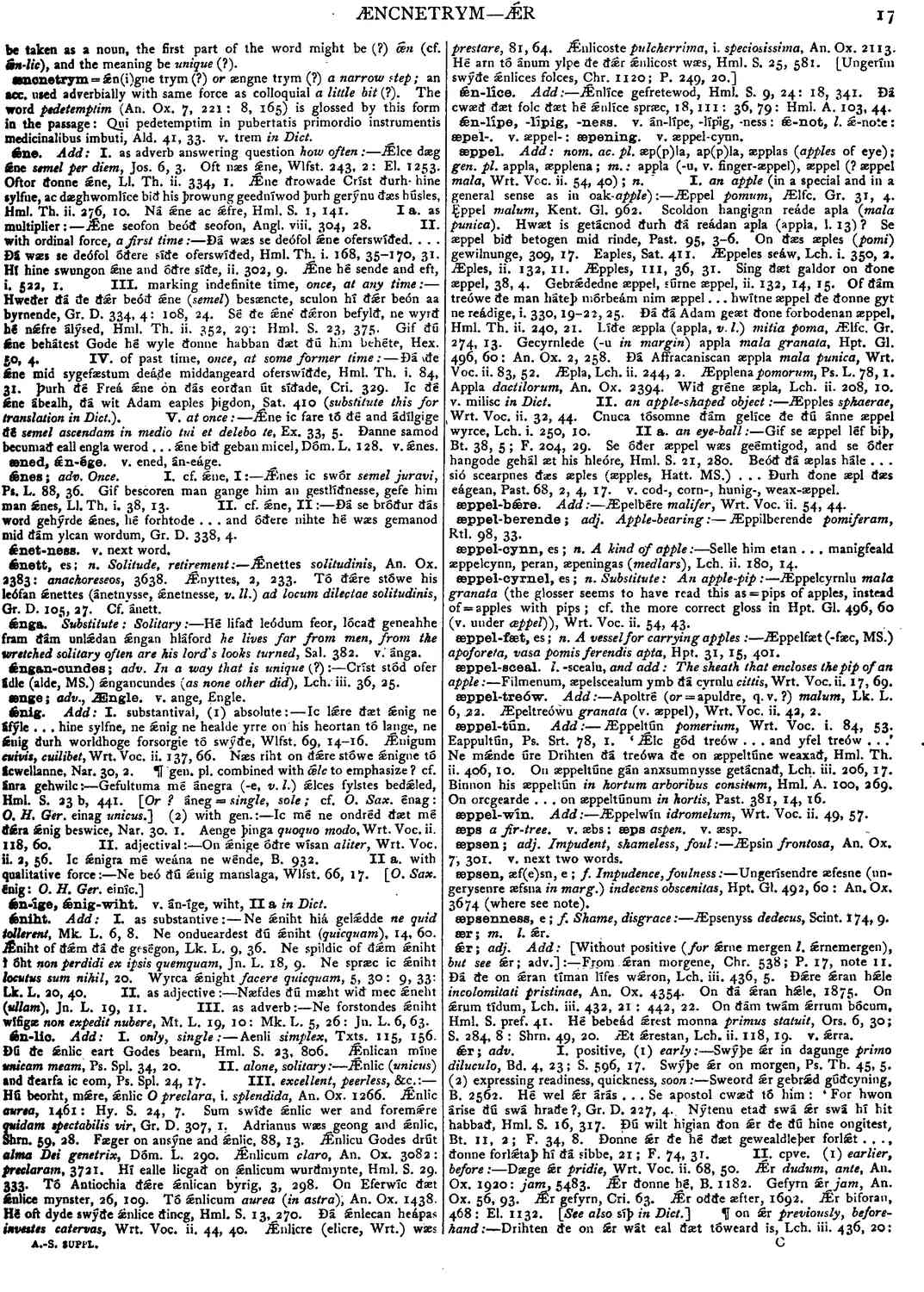ǽr
- adverb
- conjunction
-
Swýþe ǽr in dagunge
primo diluculo,
- Bd. 4, 23; S. 596, 17.
-
Swýþe ǽr on morgen,
- Ps. Th. 45, 5.
-
Sweord ǽr gebrǽd gúðcyning,
- B. 2562.
-
Hé wel ǽr árás . . . Se apostol cwæð tó him: 'For hwon árise ðú swá hraðe?,
- Gr. D. 227, 4.
-
Nýtenu etað swá ǽr swá hí hit habbað,
- Hml. S. 16, 317.
-
Ðú wilt higian ðon ǽr ðe ðú hine ongitest,
- Bt. 11, 2; F. 34, 8.
-
Ðonne ǽr ðe hé ðæt gewealdleþer forlǽt . . ., ðonne forlǽtaþ hí ðá sibbe,
- 21; F. 74, 31.
-
Dæge ǽr
pridie,
- Wrt. Voc. ii. 68, 50.
-
Ǽr dudum, ante, An. Ox. 1920:
jam,
5483. -
Ǽr ðonne hé,
- B. 1182.
-
Gefyrn ǽr
jam,
- An. Ox. 56, 93.
-
Ǽr gefyrn,
- Cri. 63.
- Ǽr oððe æfter, 1692.
-
Ǽr biforan, 468: El. 1132. [See also síþ in Dict.] ¶ on ǽr
previously, beforehand
:-- Drihten ðe on ǽr wát eal ðæt tóweard is,- Lch. iii. 436, 20:Hml. Th. i. 114, 3: Chr. 1067; P. 201, 26.
-
Hé wolde warnian on ǽr,
- Gen. 6, 6.
-
Fela þing wiste se hálga wer on ǽr, lange ǽr hí gelumpon, Hml. S. 31, 788. (1 a) making present perfect and preterite pluperfect :-- Redic ete ǽr, ne mæg ðé nán man áttre áwyrdan
if you have eaten radish, nobody can injure yon by poison,
- Lch. ii. 110, 10.
-
Ðæt feoh ðæt hí ǽr lǽfdon
the money they had left (when they were spending before,
v. l. 200),- Hml. S. 23, 213.
-
Wáron ðǽre hlǽddre stapas áléfede on ǽr
the steps of the ladder had been weakened,
- 31, 602.
-
Ic nóht ðon ǽr blon
I stopped none the sooner,
- Bd. 5, 6; S. 619, 15.
-
Náhte ðý ǽr,
- Gr. D. 152, 17. ¶ with correlative conjunction. v. ǽr; conj.
-
Hié ǽr flugon, ǽr hié tógædere geneálǽcten,
- Ors. 4, 6; S. 170, 24: Past. 433, 28.
-
Ðæt hé hié forceorfe ǽr, ǽr hié on ðá eágan feallen,
- 141, 10.
-
Hé wolde on ǽr ðæt godspell áwrítan, ǽr ðám ðe hé gewende him fram,
- Hml. S. 15, 139.
-
Manegum men is leófre ðæt hé ǽr swelte, ǽr hé geseó his wíf and his bearn sweltende,
- Bt. 10; F. 28, 39.
-
Ǽr ic mé sylfne ofsleá, ǽr ðon ic sende míne hond on ðás fǽmnan,
- Shrn. 130, 26.
-
Ðú meaht ǽlcne unðeáw on ðǽm men ǽresð be sumum tácnum ongietan . . . ǽr hé hit mid wordum cýðe,
- Past. 157, 19.
-
Tó hwilces tíman se steorra him ǽrst æteówode,
- Hml. Th. i. 78, 18.
-
Ǽst of ánre byrig, ðonne of óðerre,
- Ors. 3, 7; S. 112, 22.
-
Hé angan tó smeágenne ǽrest þinga hú hé his líf gerihtlǽcan meahte,
- Lch. iii. 438, 29: Ll. Th. ii. 316, 11. v. ǽror.
Bosworth, Joseph. “ǽr.” In An Anglo-Saxon Dictionary Online, edited by Thomas Northcote Toller, Christ Sean, and Ondřej Tichy. Prague: Faculty of Arts, Charles University, 2014. https://bosworthtoller.com/37894.
Checked: 0